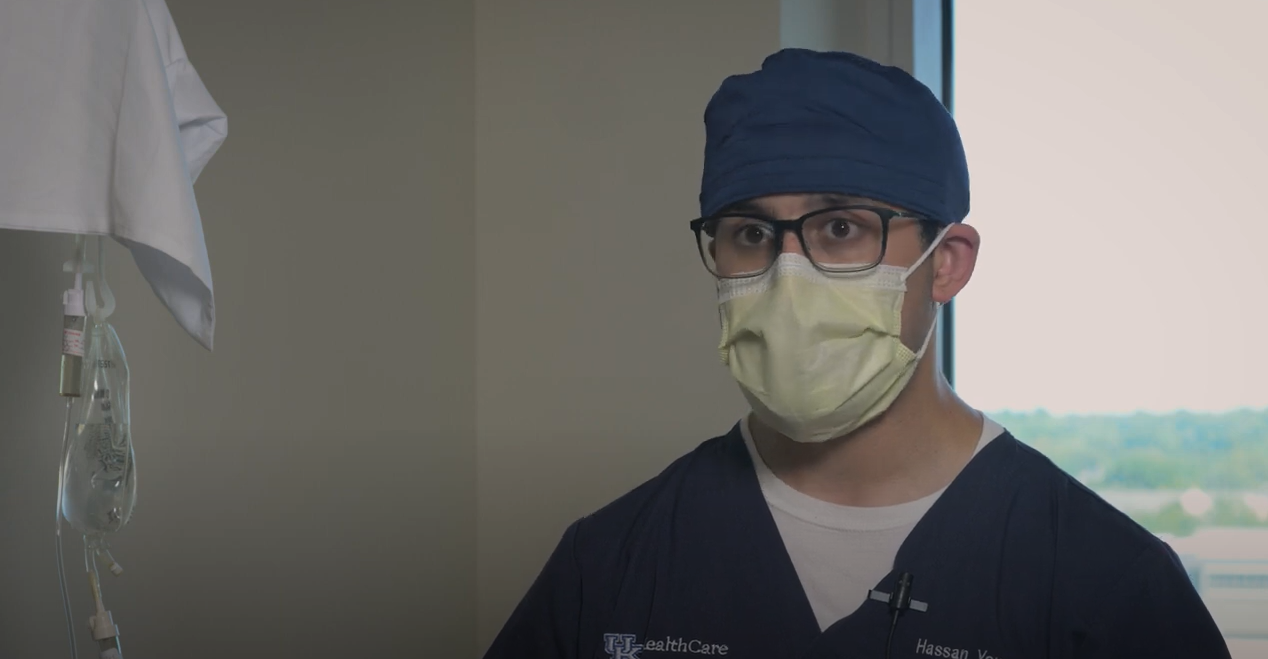Voices from the Front Lines: Dr. Hassan Yousaf

We recently joined hospital staff for a few days to document the reality of treating COVID-19 patients in UK HealthCare clinical settings.
This edited interview is part of our ongoing series, “UK HealthCare: Voices from the Front Lines,” highlighting stories and perspectives from our frontline staff who have been caring for the sickest COVID-19 patients since March 2020.
Hassan Yousaf, MD, is an internal medicine specialist and pulmonary critical care fellow at UK HealthCare.
Can you talk about what you typically did for patients prior to COVID and how that changed during the pandemic?
Prior to COVID, it was bread-and-butter critical care medicine. It was a usual ICU; good turnover, patients are getting in and out of the ICU, they were getting better. We had similar statistics (to hospitals) around the nation. And following COVID during the initial wave, most of our ICU … which we made a COVID unit, it was full of COVID patients, one after the other.
And we were just focused on COVID management. A lot of people were getting intubated, which means we have to put them on the ventilator. And we had to sedate them deeply. The numbers went down because (of) the vaccinations and the social distancing. But with this last wave … We did not see these types of patients before; young patients. And a lot of them are getting sick very fast. They will come in day one and day two, they're on the ventilator. They are deeply sedated. They are paralyzed. And the numbers are very different from what we saw before. Our numbers were high, but they were not as high as this latest wave.
Moving forward, I think it's the vaccine that's going to help people. [In September], our ICU was full and most of them were COVID patients, which is sad. In addition to that, I saw some pregnant patients as well. And those are obviously young, young ladies. The sad part is, this was all preventable.
What's the most important thing that you want someone on the outside to understand about what's it’s like in the hospital when COVID surges?
I want people to understand that it's not easy to take care of a COVID patient, for numerous reasons. People in the community don't realize what donning and doffing means. That means that you're wearing a gown, gloves and you're wearing a mask. That takes five to 10 minutes of your time. And then you go in and try to do whatever you can.
Imagine if you're seeing 20 patients and you're spending just five, 10 minutes for donning and doffing, and that takes away a lot of time out of your day. The same goes for the nursing staff as well. it just becomes very difficult.
[I’ve treated] young patients anywhere between 30 to 60 years of age. I would ask them if they’d been vaccinated or not. And they would tell me they are not vaccinated, but they want the vaccine right now. But by then, it's too late.
Did you ever anticipate seeing anything like this in your career?
I’ll be honest, I never anticipated this. This is very new for all of us. I’ve been practicing medicine in the U.S. for six years. There have been small outbreaks [of new viruses like H1N1] out there that happen in other parts of the world, but they get contained. COVID is unfortunately everywhere. It doesn't matter, it just goes everywhere.




